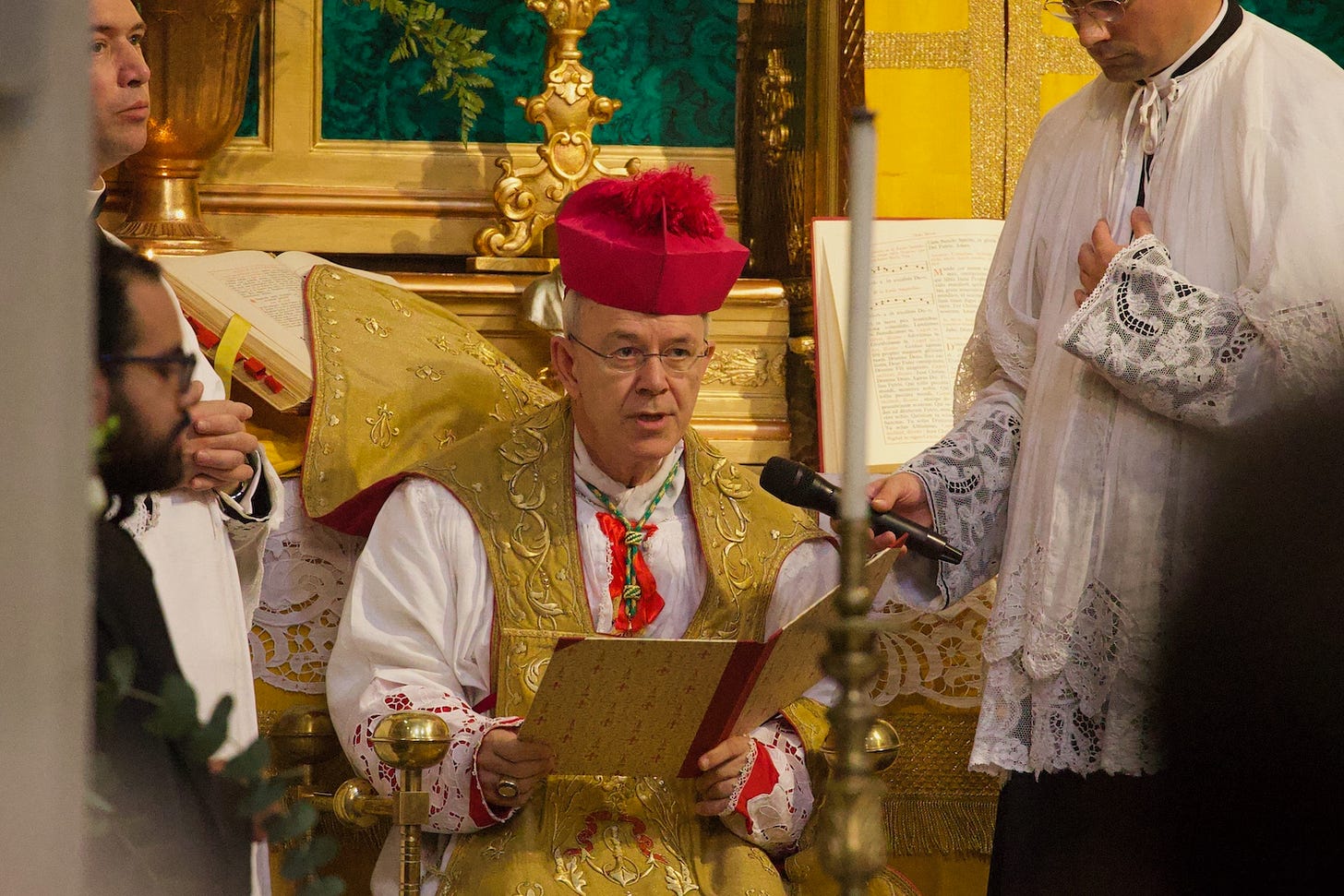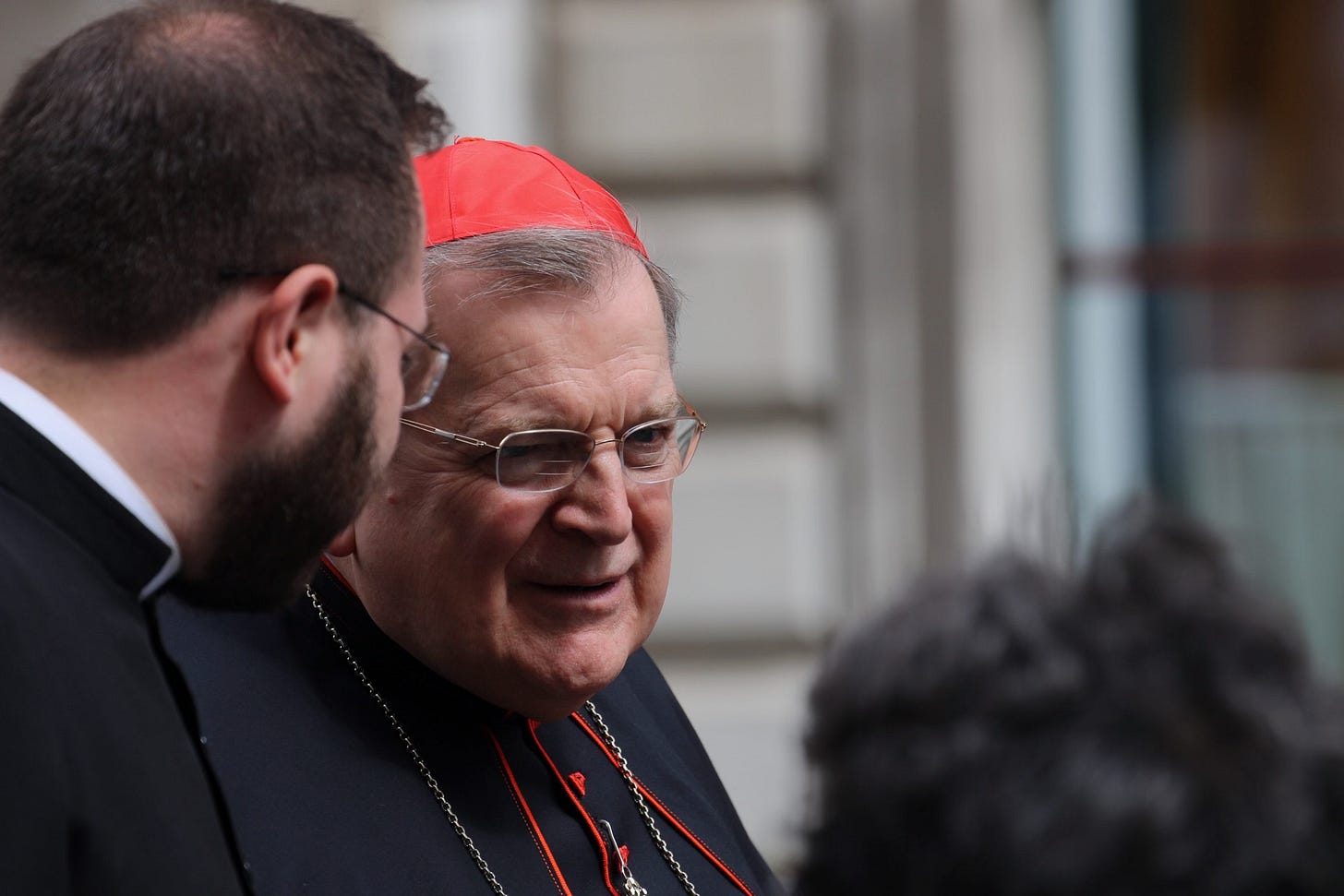Bishop Schneider: Remain Joyful in the Catholic Faith and Resist Attacks Against It
Those faithful who have resisted heresy and apostasy have been the ‘true ornaments and lights of the Church of all times’ and are promised the ‘crown of life,’ Bishop Schneider has said.

LONDON — Bishop Athanasius Schneider has encouraged the Catholic faithful to remain joyful, steadfast and fearless against the attacks of this world and from within the Church, remembering that their reward will be “the crown of life.”
Speaking June 14 to a London conference celebrating 60 years of the Latin Mass Society of England and Wales, the auxiliary bishop of Astana, Kazakhstan, implored those present to “be faithful, keep the faith, the true faith, the one Catholic and apostolic faith.”
“The loss of faith and its corruption is the greatest misfortune for man, because it affects at its root the whole relationship with God,” Bishop Schneider said, before quoting St. Augustine of Hippo who warned: "If faith falters, love itself grows cold. In fact, if a man has fallen from faith, he must necessarily also fall from love; for he cannot love what he does not believe exists.”
Bishop Schneider, who has become known and respected worldwide for his Catholic orthodoxy, recalled that throughout the Church’s history, the faith has been “attacked internally by heresies and externally by persecutions, which have also caused apostasy.” Heretics and apostates, he added, have always existed in the Church, in the laity and the clergy — a reality, he said, that the Lord points out in the parable of the field of wheat and tares.
But those who resisted heresy and apostasy “were the true ornaments and lights of the Church of all times,” he added.
In answer to the question why God permits heresies in His Church, Schneider again quoted St. Augustine who said that many in the Church are “awakened from sleep by heretics, so that they may see God’s light and be glad.” Although the errors of heretics should not be approved, St. Augustine said, their works can help “to assert Catholic discipline against their wiles.”
Citing 5th century St. Vincent of Lerins, Bishop Schneider said that “unheard of doctrine” is “permitted as a test” and, quoting St. Paul, he said it is necessary that there be heresies “so that those who are approved may be made manifest among you.”
The Kazakh bishop, who wrote Credo – A Compendium of the Catholic Faith to help the faithful relate the Church’s teaching to the modern world, went on to stress that the Catholic faith “cannot allow itself to be explained and preached with vagueness.” Again quoting St. Vincent of Lerins, he said if the “new begins to mix with the old, the foreign with the domestic, the profane with the sacred, such an evil custom will necessarily creep in universally,” leaving “nothing intact” or “uncontaminated” within the Church, and “northing healthy, nothing pure.”
Ambiguous Doctrine
Bishop Schneider also warned against doctrinal ambiguities and explained that since the Second Vatican Council, the “crisis in the Church” has been “characterized by indeterminacy and by the coexistence of contradictory doctrines and liturgical practices which are precisely the fundamental characteristics of modernism.”
St. Vincent of Lerins, he said, warned against such “profane novelties” which, if accepted, would “violate” the faith of the Fathers of the Church in whole or in part, and imply that the all the saints, clergy, faithful, and “vast army of martyrs” of the past had been in “ignorance for so long.” To the shepherds of the Church, St. Vincent stressed: “You have received gold; you must give gold in turn…transmit true gold, not counterfeit gold.”
Bishop Schneider also addressed those faithful who, in the general confusion in the Church, are “persecuted and marginalized within the Church” through what St. Augustine called “the turbulent seditions of carnal men.” Those who patiently endure such crosses, the saint said, have the intention of returning “when the tumult has subsided” but if that does not happen, “they hold fast to their purpose” and “defend to the death” the testimony of faith which is preached in the Church. These kinds of Christians are rare, St. Augustine said, but examples in history are “not lacking.”
Moreover, Bishops Schneider said, bishops have a “grave duty to resist heresies and protect their flock from such poisons,” and must act as good doctors. Quoting St. Cyprian, he warned against soothing the sinner “with flattering blandishments” that nourish the wrong-doing instead of rebuking him and “urging him onward to salvation.”
“It behooves the Lord's priest not to mislead by deceiving concessions, but to provide with salutary remedies,” St. Cyprian wrote in De lapsis. “He is an unskillful physician who handles the swelling edges of wounds with a tender hand, and, by retaining the poison shut up in the deep recesses of the body, increases it.
“The wound,” he continued, “must be opened, and cut, and healed by the stronger remedy of cutting out the corrupting parts. The sick man may cry out, may vociferate, and may complain, in impatience of the pain; but he will afterwards give thanks when he has felt that he is cured.”
Recalling Karol Wojtyla’s words in 1976, that the world was “facing the final confrontation between the Church and the anti-Church,” Bishop Schneider urged the audience to uphold the faith of their baptism, and to “keep the traditional Catholic faith” as this is “the truly effective program to protect the Church of our day from becoming a debating club through so-called synodal methods” — something, he said, that St. John Henry Newman warned about in his own time in his 1850 book Certain Difficulties Felt by Anglicans in Catholic Teaching.
“Liberalism,” the English saint said, “is the doctrine that there is no positive truth in religion, but that one creed is as good as another, and this is the teaching which is gaining substance and force daily. It is inconsistent with any recognition of any religion, as true. It teaches that all are to be tolerated, for all are matters of opinion. Revealed religion is not a truth, but a sentiment and a taste; not an objective fact, not miraculous; and it is the right of each individual to make it say just what strikes his fancy.”
No Friend of the World
Bishop Schneider, who said today’s situation has some similarities with the times of persecution of the Church, urged the faithful not to compromise the Catholic faith for “supposed earthly and temporal advantages.” Again quoting, St. John Henry Newman, he stressed that the world will never be a friend of the Catholic faith, and that the “first and last thing in the mission of the Church is the salvation of the soul for eternity.” God became man “not to turn the whole earth into heaven, but to bring down a heaven upon earth,” Newman said.
But a Catholic, Bishop Schneider said, must at the same time “be fearless against the attacks of the world,” confident of Christ’s victory, and know he has entered the barque of Peter not to escape the world, “but to go forth in it upon the flood of sin and unbelief which would sink any other craft.” The Church is Catholic, St. John Henry Newman wrote in Discourses to Mixed Congregations, “because she brings a universal remedy for a universal disease. The disease is sin.”
Quoting Saint Elizabeth Hesselblad, a Swedish convert who refounded the Order of Saint Bridget in the 20th century, Bishop Schneider said God had instilled such a strong faith in her at the moment of her conversion, that she said, “Even if the Pope and all the priests were to lose the Catholic faith, my faith would still remain unshaken.”
“The Church can never be defeated by heresies,” encouraged Bishop Schneider in closing, adding that, as St.Augustine said, “they all came out of her, like useless branches pruned from the vine; but the Church always remains in her root, in her vine, in her charity. The gates of hell will not prevail against her.”
“Keep the faith, united under the banner of Christ the King,” Bishop Schneider said. “Rejoice over the Catholic Faith!” And quoting Revelation 2:10, he added: “Be faithful until death, and I will give you the crown of life!”
Read the full text of Bishop Schneider’s talk here.
***
Also published:
Cardinal Burke: Doctrinal and Moral Corruption ‘Directly Related’ to Abuse of the Liturgy
Recalling the warnings of popes and saints, Cardinal Burke said neglect of liturgical law and tradition has paved the way for widespread confusion about faith and morals.
LONDON — Cardinal Raymond Burke has appealed to Pope Leo XIV to lift the restrictions on the pre-1970 liturgy, stressing that respect for liturgical tradition is critical for the Catholic Church’s mission and that doctrinal and moral corruption shows itself in “divisions and factions” that lead to liturgical abuse.
Speaking via video link to a London conference celebrating 60 years of the Latin Mass Society of England and Wales, Cardinal Burke recalled that the most serious difficulty St. Paul faced in the early Church in Corinth was the “abuse that had entered into the celebration of the Most Holy Eucharist” and that it was “directly related to doctrinal and moral divisions among members of the community.”
Church history, he said, shows that “doctrinal and moral corruption in the Church is manifested in the falsification of divine worship,” adding that “where the truth of doctrine and the goodness of morals are not respected, neither is the beauty of worship.”
The solution, he said, is a renewed respect for Tradition and the laws governing the sacred liturgy…
Read the rest of the article at NCRegister.com
Read the full text of Cardinal Burke’s talk here.




Deo Gratias!
Thdnjs! Wonderful quotes by St Lerin, St John Henry Newman am Swedish St Elisabeth Hesselblad.